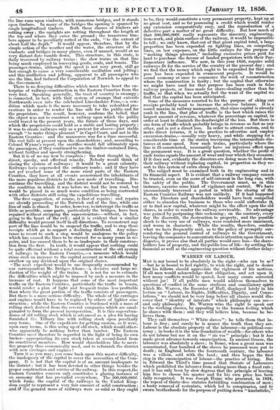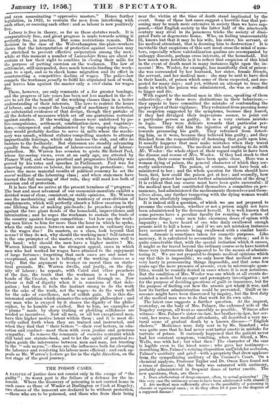WARREN ON LABOUR.
MAN is not bound to be absolutely in the right--who can be so? —but he is bound to feel rightly, to wish the right, and to desire that his fellows should appreciate the rightness of his motives. If all men would acknowledge that obligation, and act upon it, how many conflicts would be spared, how many errors corrected without jar ! If all public men would address themselves to questions of conflict in the same studious and conciliatory spirit which Mr. Warren, the Recorder of Hall, displayed lately in his lecture on "Labour, its Rights, ])ifficulties, Dignity, and Conso- lations," we should not be very long before all classes would dis- cover that "identity of interests" which philosophy can see— and only philosophy. Mr: Warren wins the right to speak out to the working classes, by appealing to the human feeling which he shares with them ; and they will believe him, because he be- lieves them.
They call themselves "White slaves " : he tells them that la- bour is,..free ; and surely he is nearer the truth than they are. Labour is the absolute property of the labourer—in political-eco- nomy; in books it is the true foundation of wealth—for others who do not labour but use it on the" sic vos " principle ; but it has made great advance towards emancipation. In ancient Greece, the labourer was absoltitielri:dslave ; in Rome when a great man was
assassinated, four h of the slaves he possessed were put to death ; in England before the fourteenth century, the labourer was a villein, sold with the land ; and then began the first step in the emancipation of labour—the practice of hiring. But in 'Edward the Third's time passed that Statute of Labourers which prohibited the labourer from asking More than a fixed rate ; and it his only been by slow degrees that the principle of leaving him free to choose his ipaster and fix his own price has been fully recognized. It was Joseph Mune who procured, in 1824, the repeal of thirty-five statutes forbidding combination of men ; a hasty removal of restraints, which led to conspiracies, and to sworn brotherhoods for the purpose of putting down "knobstioks," cad even assassinating "oppressive masters." Hence further legislation, in 1825, to restrain the men from interfering with each other, or coercing each other : and so labour is now positively free.
Labour is free in theory, so far as these statutes reach. It is comparatively free, and great progress is made towards setting it perfectly free, in practice. But some restrictions remain. e aeeision in the case of the Wolverhampton tin-plate-workers shows that the interpretation of protection against coercion may be stretched to prevent effective cooperation among the men ; while at this moment a number of Lancashire firms are about to sustain at law their right to combine in closing their mills for the purpose of putting coercion on the workmen. The law of settlement, still unrepealed, does much towards binding the work- man to a spot, and so to cheek home migration and its effect in counteracting a competitive decline of wages. The police-law compels the workman penally to fulfil his stipulated task of work, and leaves him against the master only a civil claim for wages due.
These, however, are only remnants of a far greater bondage, and the progress of late years has been not less marked in the de- sire to act for the benefit of the working classes than in a better understanding of their interests. The laws to restrict the hours of labour, and to compel the boxing7off of machinery in factories, are substantial evidences of that design, though they partake of all the defects of measures which set off one gratuitous restraint against another. If the working classes were unfettered by po- lice-compulsions settlement, combination-laws, and, vagrancy- laws,—interpreted and administered by the employing class,— they would probably decline to serve in mills where the machi- nery was unsafe,.-without statutes compelling masters to attempt impracticable feneings, which only increase the risk, and offer no barriers to the foolhardy. But statesmen are steadily advancing equally from the dogmatism of labour-coercion and of labour- protection. Mr. Warren has occasion to quote Sir Robert Peel, whose far-seeing views, even at an early age; are attested by Plainer Ward, and whose practical and progressive liberality was proved by his votes and speeches in Parliament. Peel was for removing restraintann labour, for increasing its protections ; but above the mere material restate of political economy he set the moral welfare of the labouring class ; and when statesmen have learned the full meaning of that rule, they will need. less both of coercion and of protection.
It is here that we arrive at the present terminus of "progress." The best and most advanced of our monomist-moralists exhibit a decided want of clear, consistent, or stable opinions. Mr. Warren sees the mechanizing and debasing tendency of over-division of employments, which will perfectly absorb a fellow creature in the one lifelong idea of making pin-heads ; he preaches eloquently against the two giant fiends of the household, improvidence and intoxication ; and he urges the workman to sustain the trade of the country against foreign competition : but how can the work- ing men listen to him for more than the hour in which he spoke, when the only nexus between man and master in ordinary days is the wages due ? Do masters, as a class look beyond that
nexus ? if they do sot, why should the workingmen ? Self-interest is the one prompter of the master, even when he behaves well to his hand: why should the men have a higher motive ? Mr. Warren himself urges, as the strongest appeal, cases in which men who had worked for wages have attained to the enjoyment of large fortunes ; forgetting that such cases are and must be exceptional, and that he is talking of the working classes as a body. But the argument is weaker on moral than on statis- tical grounds. Mr. Warren dwells, and justly, on the dig- nity of labour ; he repeats, with Caird and other preachers of the day, the truth that the workman is a tool in the hands of the Creator, who works in us and through us. Now labour t's full of dignity when it is conscious of that dele- gation; but then it feels the instinct strew,i' to do the work for the sake of the work, not the wages—to do the work well for the sake of excellence, not of selfish gain. It is this dis- interested ambition which animates the scientific philosopher and any man who is swayed by it shares the dignity of the Philo- sopher, be he humble or exalted. But to him, no examples of " plums " made by sharp trading or plodding selfishness are needed as incentives. Now all men or all but exceptional men, have this higher motive latent within them ; and it is most di- rectly called forth when they are trained and instructed, and when they find that "their betters "—their real betters, in edu- cation and conduct—meet them with even justice and generous sympathy. To remove the remnants of coercive restraint which still taint our statute-book, and to let the spirit of practical re- ligion guide the intercourse between man and man, not trusting. in the sole nexus,"—these are the influences both for elevating the labourer and rendering his labour more efficient : and such ap- peals as Mr. Warren's lecture go far in the right direction, on the last stage of the good journey.



























 Previous page
Previous page